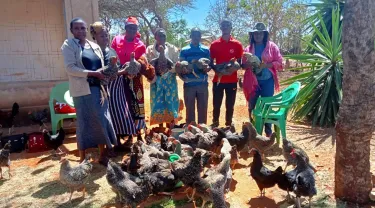About 400 million women globally keep livestock as a source of income. And each year, millions of them suffer financial losses when livestock diseases infect their animals. Yet some of these diseases, such as Newcastle disease (NCD) in chickens and Rift Valley Fever (RVF) in goats, sheep, and cows, are preventable with vaccines.
The problem, according to Hellen Amuguni, associate professor at Cummings School of Veterinary Medicine at Tufts University, has to do with gender disparities and limited access to animal health information and livestock vaccines. Access to veterinary vaccines has been shown to improve both human and animal health through more productive livestock, better livelihoods for women, and improved well-being and food security for their families.
But in some countries, cultural gender roles and power dynamics mean that women are less likely than men to get access to vaccines.
That’s an issue Amugun addresses through her work as one of the principal investigators of the SheVax+ action research project, which aims to empower African women smallholder livestock farmers and help them benefit from livestock vaccines as entrepreneurs and livestock owners. SheVax+ spans Kenya, Rwanda, and Uganda, where 75% to 90% of small-scale poultry farmers are women whose livestock is frequently decimated by NCD and RVF.
As project director of STOP Spillover, a Tufts-led, USAID-funded global consortium of experts in human, animal, and environmental health who address the risks posed by known zoonotic viruses that have the potential to spill over and cause pandemic crises, Amugun has a deep interest in improving human and animal health.
In carrying out the SheVax+ project, researchers closely collaborated with local women and community leaders. “We created a system and a network including government regulators, vaccine distributors, veterinarians, and agrovet owners who will support our women smallholder farmers and animal health service providers (AHSPs) going forward,” said Amuguni.
After the project was implemented, 80% of the women in the SheVax+ communities were able to vaccinate their chickens against NCD—and more than 70% of rural communities can now access AHSPs. Whereas previously only 10% of women in the communities could access goat vaccines, now more than 50% can. SheVax+ has been able to elevate the AHSPs into entrepreneurs who make an income between $50 to $300 dollars a month.
“Our project is not just a vaccine project,” said Amugun. “It's a gender transformative vaccine project. It looks at both the technical and logistical issue of helping women access vaccines, as well as the social and cultural issues that stop women from taking their role in the vaccine value chain.”
